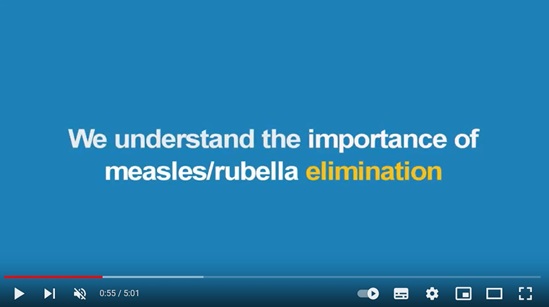
Measles and Rubella Laboratory Network
High-quality laboratory investigation is critical to understanding the impact of a country's vaccination programme on the prevalence and spread of disease. Suspected cases of measles and rubella may well be caused by other pathogens that have similar clinical symptoms. Even a penicillin allergic rash can be mistaken for a measles or rubella infection. The only way to confirm whether a case is actually measles or rubella is to test a suitable clinical specimen taken from the patient after the onset of rash for the presence of immunoglobulin M (IgM) antibodies or viral RNA.
LabNet members
To facilitate high-quality laboratory investigation, WHO/Europe coordinates a European Measles and Rubella Laboratory Network (LabNet) established in 2002. LabNet comprises 73 laboratories, namely:
- 69 subnational and national reference laboratories in 50 of the Region's 53 Member States
- 3 regional reference laboratories in Luxembourg; Berlin, Germany; and Moscow, Russian Federation
- a global specialized laboratory in London, United Kingdom.
Performance assessment
WHO/Europe supervises an annual accreditation review that assesses the performance of the participating laboratories based mainly on:
- workload
- timeliness and completeness of reporting laboratory data, including genotyping
- an external quality assurance programme
- implementation of internal quality control procedures
- the score from an on-site review, conducted periodically by the Regional Laboratory Coordinator or delegate.
Specimen-based database
In 2012, WHO/Europe developed the Measles Rubella Laboratory Data Management System database (MRLDMS). This specimen-based database is a tool for online reporting of laboratory results that links epidemiological and laboratory datasets. This link is critical to achieve quality case-based surveillance. Several LabNet laboratories have already adopted this system (more than 14 800 records so far) and efforts are ongoing to increase uptake of this system by the whole Network.
Evidence base for measles and rubella elimination
As the Region works to achieve measles and rubella elimination, it is important to identify hot spots of virus circulation, understand routes of transmission, establish the source of importations and monitor the progress of elimination to inform the verification process. In all of these areas, molecular epidemiology has become a crucial tool, and this is another important component of the work undertaken by LabNet.
Genotype information is available online in the WHO genetic databases MeaNS and RubeNS, which were jointly established by WHO and the Global Specialized Laboratory (London). WHO European Measles and Rubella reference laboratories have recorded so far more than 11 100 measles virus sequences in MeaNS and more than 340 rubella virus sequences in RubeNS.
Related technical work
Related health topics
Related content
Publications
All →
Meetings of the Measles/Rubella Laboratory Network in the WHO European Region: 13–16 November 2018, Copenhagen,...
On 13–15 and 14–16 November 2018, two partially overlapping meetings of the WHO European Regional Measles/Rubella Laboratory Network (MR...

14th meeting of the Measles/Rubella Regional Reference Laboratories of the WHO European Region: 14–15...
The 14th meeting of the Measles/Rubella Regional Reference Laboratories (RRL) of the WHO European Region was held in Esch-sur-Alzette, Luxembourg...

13th meeting of the Measles/Rubella Regional Reference Laboratories: 15–16 March 2018, Copenhagen
The 13th meeting of the European Measles/Rubella Regional Reference Laboratories took place in Copenhagen, Denmark on 15- 16 March 2018.Participants were...

WHO European Regional measles/rubella LabNet meeting for western and central European countries, Turkey...
The 2016 meeting of the WHO western and central Europe, Georgia and Turkey Measles/Rubella LabNet took place in Budva, Montenegro, from the 27-29 June....





